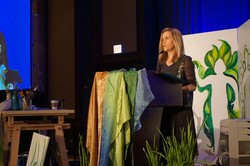On the second day of the 2016 Association of Presbyterian Church Educators (APCE) event—held here from January 27–30—the day’s worship leaders, speakers, and honorees all in their own way continued in a bold exploration of the disconnect between Jesus and the church.
Preaching—and then later speaking—to a rapt audience representing the Presbyterian Church (U.S.A.), the Reformed Church in America, The Presbyterian Church in Canada, the Moravian Church in America, and the Christian Reformed Church in North America, Lillian Daniel chose 1 Corinthians 11:17:19 and Luke 12:7 as her main texts.
Daniel—the celebrated speaker, writer, and author of When Spiritual But Not Religious Is Not Enough: Seeing God In Surprising Places among other works—preached “A Million Canaries Can’t Be Wrong.”
Setting her sermon in the sharply divided Corinthian church, where the people realized that “Jesus had left the building, wasn’t coming back, and it’s up to us,” Daniel drew a parallel with the contemporary church, where members, whenever they gather, start lecturing and picking at each other.
“The one good thing you can say about John the Baptist is that he knew he was not Jesus,” said Daniel. “We could use more leaders like that in the church.”
Her sermon’s catchy title became clear as she explained why she chose to read the Lucan passage from The Message, which translates the more traditional “sparrow” as “canary.”
“It’s just so jarring because we’ve heard sparrow so many times that it can’t just be a ‘sparrow’ sparrow, it’s God’s sparrow, a special sparrow that God pays attention to,” said Daniel. “A canary? Are you kidding me? They’re so chirpy. You can’t take seriously a member of God’s kingdom who is tiny and yellow. Yet God never overlooks a single canary. You’re worth than a million canaries.”
Drawing a parallel to the improvisational comedy troupe that entertained the gathering on the previous evening, Daniel said that those who work in the church, whether as staff or volunteers, are all improvisers. “You can’t even enjoy Sunday morning anymore,” she said. “It’s the comforting word that all of us are always improvising.”
But, she concluded, “We are at a moment in the church’s history where we can try to be Christianity without power. We have a shot to really follow Jesus, to bring the good news to the canaries, but first we have to accept it ourselves.”
Following a time of prayer, the gathering reconvened in plenary to hear Daniel elaborate on her recent research and writing, particularly the unsettling trend that to be prejudiced against organized religion has become an “acceptable prejudice in American culture."
Wondering why Christians are not offended by such bigotry, Daniel said that liberal Protestants tend to embrace tolerance and diversity to a fault, so much so that they don’t make a case for anything.
“We lost the ability to talk or say anything clear about our faith,” she said, “and we’re in a time when people don’t know. Whenever we get together and we pass these big resolutions on what the Middle East should do or we tear ourselves up about gay marriage, nobody cares.”
Daniel said that what those who characterize themselves as religious “nones” really care and want to hear about is God. They want to know who Jesus is. But instead of responding to their questions, she said, liberal Protestants tend to send them to membership classes or invite them to join committees.
She charged the church to be “rigorous, reasonable, and real” in order to reach the “nones” more effectively. To be rigorous because formation matters; to be reasonable because “just because we’re not fundamentalist doesn’t mean we can’t talk about what we believe and what we don’t believe"; and to be real with prayer requests that can include everything.
“The ‘nones’ are going to change the church,” Daniel said, “either by their presence or their absence.”

